北师大版(2019)高中英语选择性必修第二册 Unit 4 Humour Lesson 1 What’s So Funny精品课件(共22张PPT)
文档属性
| 名称 | 北师大版(2019)高中英语选择性必修第二册 Unit 4 Humour Lesson 1 What’s So Funny精品课件(共22张PPT) |
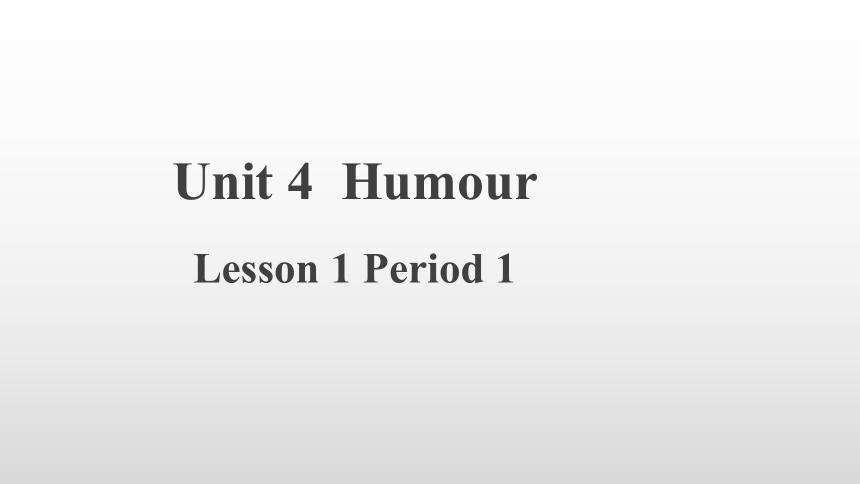
|
|
| 格式 | pptx | ||
| 文件大小 | 1.5MB | ||
| 资源类型 | 教案 | ||
| 版本资源 | 北师大版(2019) | ||
| 科目 | 英语 | ||
| 更新时间 | 2023-03-16 15:32:47 | ||
图片预览

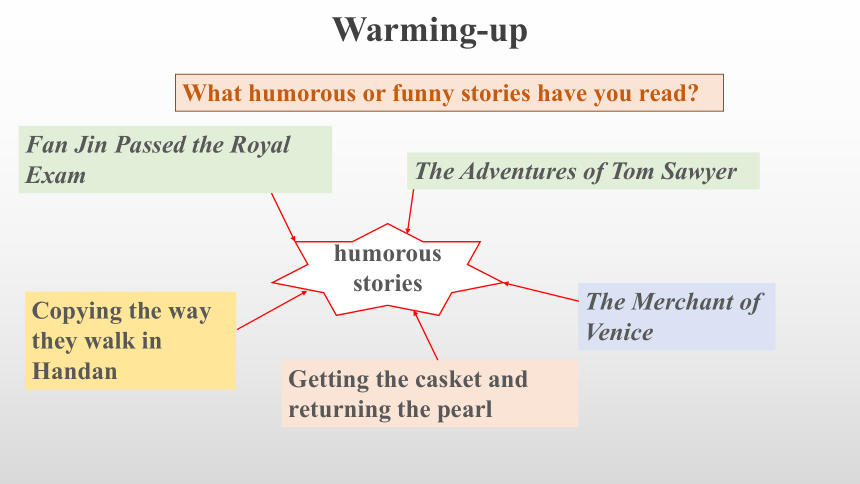
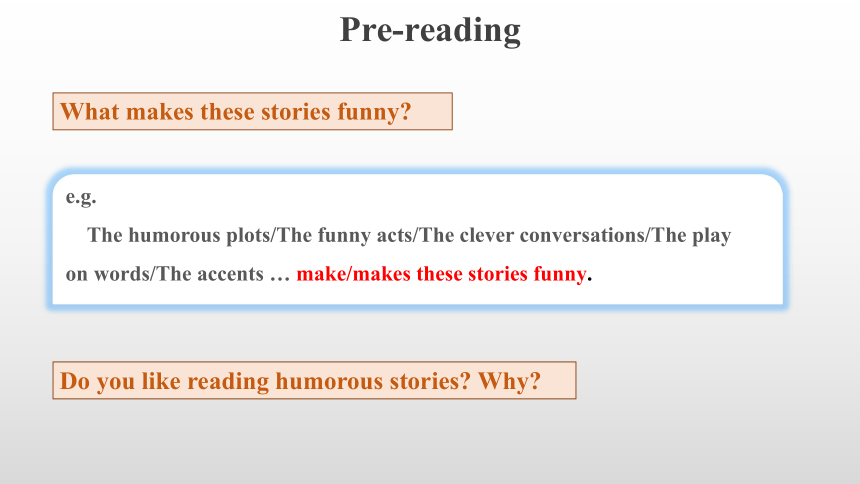

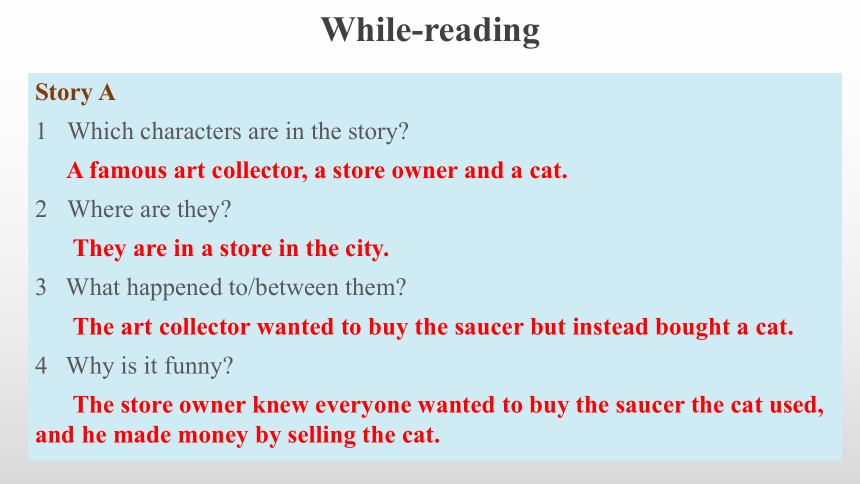
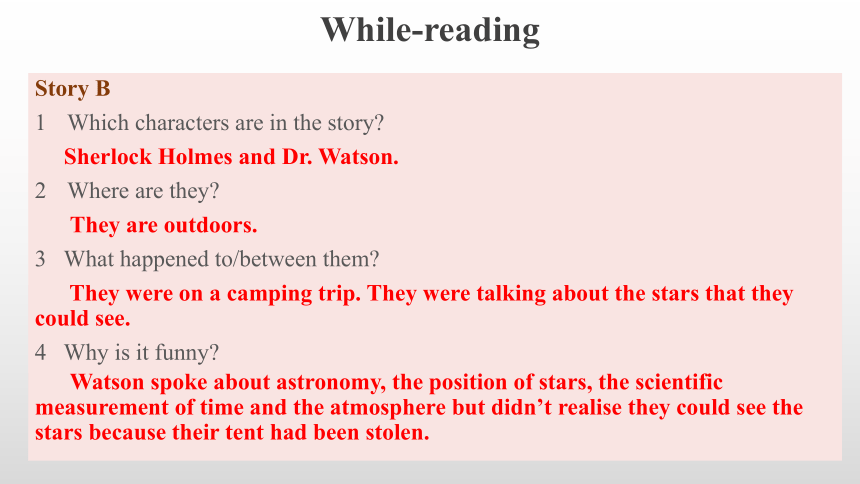
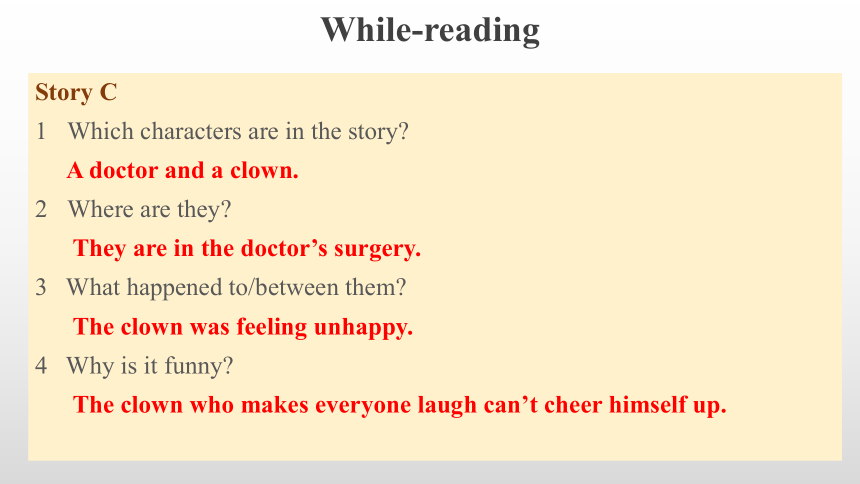
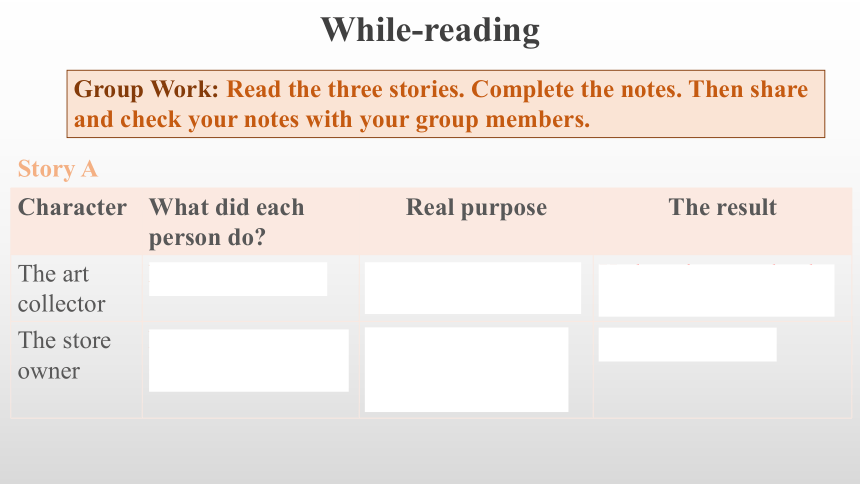
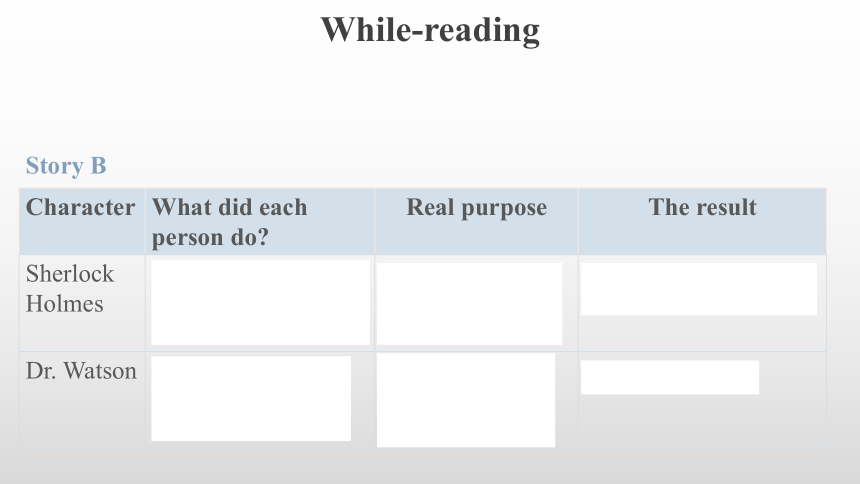
文档简介
(共22张PPT)
Unit 4 Humour
Lesson 1 Period 1
Warming-up
What humorous or funny stories have you read
humorous stories
Fan Jin Passed the Royal Exam
The Adventures of Tom Sawyer
The Merchant of Venice
Getting the casket and returning the pearl
Copying the way they walk in Handan
Pre-reading
What makes these stories funny
Do you like reading humorous stories Why
e.g.
The humorous plots/The funny acts/The clever conversations/The play on words/The accents … make/makes these stories funny.
While-reading
Which characters are in the story
Where are they
What happened to/between them
Why is it funny
Work in groups of three. Each student reads one of the stories and answer the following questions.
While-reading
Story A
Which characters are in the story
A famous art collector, a store owner and a cat.
Where are they
They are in a store in the city.
3 What happened to/between them
The art collector wanted to buy the saucer but instead bought a cat.
4 Why is it funny
The store owner knew everyone wanted to buy the saucer the cat used, and he made money by selling the cat.
While-reading
Story B
Which characters are in the story
Sherlock Holmes and Dr. Watson.
Where are they
They are outdoors.
3 What happened to/between them
They were on a camping trip. They were talking about the stars that they could see.
4 Why is it funny
Watson spoke about astronomy, the position of stars, the scientific measurement of time and the atmosphere but didn’t realise they could see the stars because their tent had been stolen.
While-reading
Story C
Which characters are in the story
A doctor and a clown.
Where are they
They are in the doctor’s surgery.
3 What happened to/between them
The clown was feeling unhappy.
4 Why is it funny
The clown who makes everyone laugh can’t cheer himself up.
While-reading
Group Work: Read the three plete the notes. Then share and check your notes with your group members.
Character What did each person do Real purpose The result
The art collector He bought a cat. He wanted to buy the saucer. He bought a cat that he didn’t want.
The store owner He made money by selling the cat. He knew everyone wanted to buy the saucer. He made money.
Story A
While-reading
Character What did each person do Real purpose The result
Sherlock Holmes He woke up and asked Watson what he saw. He wanted to confirm that their tent was stolen. He realised their tent was stolen.
Dr. Watson He spoke about astronomy and the stars he saw. He wanted to show off his knowledge. He didn’t realise.
Story B
While-reading
Character What did each person do Real purpose The result
The middle-aged man He told the doctor that he was feeling down. He wanted to see how he could feel better. The clown who makes everyone laugh can’t cheer himself up.
The doctor She asked the clown questions. She wanted to figure out what was wrong. She suggested that he go to see the clown who cheered everyone up.
Story C
While-reading
Work Independently: Complete the funny part of the three stories.
Story The funny part
A The store owner refused to give away the saucer with the cat because
he has sold 68 cats because of the saucer.
B Sherlock and Dr. Watson saw millions of stars at night because
their tent was stolen.
C An amazing clown couldn’t
cheer himself up.
While-reading
Group Work: Tell one of the three stories to your group based on your notes.
Form new groups.
Each student summarises one of the three stories.
You can use your notes and answers from the previous activities to help.
Complete the summaries with the words or phrases you have learnt from the stories.
An art collector noticed a cat lapping milk from a 1 saucer in the 2 doorway of a store. He realized that it was an 3 antique and very valuable. He decided to buy the cat and offered to pay 200 dollars in the end. Then he asked the store owner to 4 throw in the saucer, but the owner refused to give it away for he had sold 68 cats because of the lucky saucer.
While-reading
Sherlock Holmes asked his 5 faithful friend Dr. Watson what he saw from the sky. “6 Millions and millions of stars,” said Dr. Watson. Based on his knowledge on 7 astronomy, he believed there are millions of galaxies and 8 billions of planets. He deduced that it was probably a quarter past three based on the 9 scientific measurement of time. From the 10 current atmosphere, he forecasted that it would be a beautiful day the next day. Watson didn’t realise that someone had stolen their tent!
While-reading
A middle-aged man who was 11 depressed went to the doctor. The doctor examined him and found 12 everything was (working) OK. The doctor thought that what the man needed was 13 a good laugh, and suggested 14
a circus performance. Actually he was 15 the amazing clown.
While-reading
Post-reading
Pair Work: Read the jokes below and talk about the funny part of each joke.
Girl: Why was the cat sitting on the computer
Boy: He was keeping an eye on the mouse.
The funny part is the play on the meaning of “mouse”. The computer mouse has the same name as the real mouse.
Post-reading
Teacher of politics: Who is the speaker of the House
Student: Mother.
The funny part is the play on the meaning of “the House (众议院)”. In politics it often refers to the political institute and is capitalised. The student understood it to be the household. The mother is often thought of as the speaker as she tends to talk more at home and decides on household matters.
Student: Professor, I did the best I could on this test. I really don’t think I deserve a zero.
Professor: Neither do I. But that’s the lowest grade I’m allowed to give.
The funny part is that the student is complaining about the low mark and professor responds as it is actually higher than what he deserves. The professor uses sarcasm (讽刺) here.
Post-reading
Post-reading
Teacher: What is the chemical formula (化学式) for water
Student: HIJKLMNO!
Teacher: What are you talking about
Student: Yesterday you said it’s H to O!
The funny part is the play on “to”, which sounds the same; a number two or going from one point to another. It implies that the student doesn’t know what a formula is.
Which of the three stories do you like most Write a short passage to give your reasons.
Story A
Story B
Story C
Assignment
Notes
1. … so he walked casually into the store and innocently offered to buy the cat for 200 dollars.
innocently: 装作若无其事地
[innocent]
1) be innocent of 无辜的,无罪的
He was sure that the man was innocent of any crime.
他确信此人是清白无罪的。
[反] be guilty of 有罪的
2) naive 天真无邪的
a naive young child 天真无邪的小孩子
3) n. innocence
Notes
2. “And What do you deduce from that ”
[deduce] v. 推断,演绎
1) adj. deductive 推断的,演绎的 n. deduction 演绎法
2) [反]induce: v. 归纳
adj. inductive 归纳的 n. induction 归纳法
3) … according to the studies on astronomy …
[astronomy] 天文学
astronomer 天文学家 astronaut 宇航员
Unit 4 Humour
Lesson 1 Period 1
Warming-up
What humorous or funny stories have you read
humorous stories
Fan Jin Passed the Royal Exam
The Adventures of Tom Sawyer
The Merchant of Venice
Getting the casket and returning the pearl
Copying the way they walk in Handan
Pre-reading
What makes these stories funny
Do you like reading humorous stories Why
e.g.
The humorous plots/The funny acts/The clever conversations/The play on words/The accents … make/makes these stories funny.
While-reading
Which characters are in the story
Where are they
What happened to/between them
Why is it funny
Work in groups of three. Each student reads one of the stories and answer the following questions.
While-reading
Story A
Which characters are in the story
A famous art collector, a store owner and a cat.
Where are they
They are in a store in the city.
3 What happened to/between them
The art collector wanted to buy the saucer but instead bought a cat.
4 Why is it funny
The store owner knew everyone wanted to buy the saucer the cat used, and he made money by selling the cat.
While-reading
Story B
Which characters are in the story
Sherlock Holmes and Dr. Watson.
Where are they
They are outdoors.
3 What happened to/between them
They were on a camping trip. They were talking about the stars that they could see.
4 Why is it funny
Watson spoke about astronomy, the position of stars, the scientific measurement of time and the atmosphere but didn’t realise they could see the stars because their tent had been stolen.
While-reading
Story C
Which characters are in the story
A doctor and a clown.
Where are they
They are in the doctor’s surgery.
3 What happened to/between them
The clown was feeling unhappy.
4 Why is it funny
The clown who makes everyone laugh can’t cheer himself up.
While-reading
Group Work: Read the three plete the notes. Then share and check your notes with your group members.
Character What did each person do Real purpose The result
The art collector He bought a cat. He wanted to buy the saucer. He bought a cat that he didn’t want.
The store owner He made money by selling the cat. He knew everyone wanted to buy the saucer. He made money.
Story A
While-reading
Character What did each person do Real purpose The result
Sherlock Holmes He woke up and asked Watson what he saw. He wanted to confirm that their tent was stolen. He realised their tent was stolen.
Dr. Watson He spoke about astronomy and the stars he saw. He wanted to show off his knowledge. He didn’t realise.
Story B
While-reading
Character What did each person do Real purpose The result
The middle-aged man He told the doctor that he was feeling down. He wanted to see how he could feel better. The clown who makes everyone laugh can’t cheer himself up.
The doctor She asked the clown questions. She wanted to figure out what was wrong. She suggested that he go to see the clown who cheered everyone up.
Story C
While-reading
Work Independently: Complete the funny part of the three stories.
Story The funny part
A The store owner refused to give away the saucer with the cat because
he has sold 68 cats because of the saucer.
B Sherlock and Dr. Watson saw millions of stars at night because
their tent was stolen.
C An amazing clown couldn’t
cheer himself up.
While-reading
Group Work: Tell one of the three stories to your group based on your notes.
Form new groups.
Each student summarises one of the three stories.
You can use your notes and answers from the previous activities to help.
Complete the summaries with the words or phrases you have learnt from the stories.
An art collector noticed a cat lapping milk from a 1 saucer in the 2 doorway of a store. He realized that it was an 3 antique and very valuable. He decided to buy the cat and offered to pay 200 dollars in the end. Then he asked the store owner to 4 throw in the saucer, but the owner refused to give it away for he had sold 68 cats because of the lucky saucer.
While-reading
Sherlock Holmes asked his 5 faithful friend Dr. Watson what he saw from the sky. “6 Millions and millions of stars,” said Dr. Watson. Based on his knowledge on 7 astronomy, he believed there are millions of galaxies and 8 billions of planets. He deduced that it was probably a quarter past three based on the 9 scientific measurement of time. From the 10 current atmosphere, he forecasted that it would be a beautiful day the next day. Watson didn’t realise that someone had stolen their tent!
While-reading
A middle-aged man who was 11 depressed went to the doctor. The doctor examined him and found 12 everything was (working) OK. The doctor thought that what the man needed was 13 a good laugh, and suggested 14
a circus performance. Actually he was 15 the amazing clown.
While-reading
Post-reading
Pair Work: Read the jokes below and talk about the funny part of each joke.
Girl: Why was the cat sitting on the computer
Boy: He was keeping an eye on the mouse.
The funny part is the play on the meaning of “mouse”. The computer mouse has the same name as the real mouse.
Post-reading
Teacher of politics: Who is the speaker of the House
Student: Mother.
The funny part is the play on the meaning of “the House (众议院)”. In politics it often refers to the political institute and is capitalised. The student understood it to be the household. The mother is often thought of as the speaker as she tends to talk more at home and decides on household matters.
Student: Professor, I did the best I could on this test. I really don’t think I deserve a zero.
Professor: Neither do I. But that’s the lowest grade I’m allowed to give.
The funny part is that the student is complaining about the low mark and professor responds as it is actually higher than what he deserves. The professor uses sarcasm (讽刺) here.
Post-reading
Post-reading
Teacher: What is the chemical formula (化学式) for water
Student: HIJKLMNO!
Teacher: What are you talking about
Student: Yesterday you said it’s H to O!
The funny part is the play on “to”, which sounds the same; a number two or going from one point to another. It implies that the student doesn’t know what a formula is.
Which of the three stories do you like most Write a short passage to give your reasons.
Story A
Story B
Story C
Assignment
Notes
1. … so he walked casually into the store and innocently offered to buy the cat for 200 dollars.
innocently: 装作若无其事地
[innocent]
1) be innocent of 无辜的,无罪的
He was sure that the man was innocent of any crime.
他确信此人是清白无罪的。
[反] be guilty of 有罪的
2) naive 天真无邪的
a naive young child 天真无邪的小孩子
3) n. innocence
Notes
2. “And What do you deduce from that ”
[deduce] v. 推断,演绎
1) adj. deductive 推断的,演绎的 n. deduction 演绎法
2) [反]induce: v. 归纳
adj. inductive 归纳的 n. induction 归纳法
3) … according to the studies on astronomy …
[astronomy] 天文学
astronomer 天文学家 astronaut 宇航员
同课章节目录
- Unit 4 Humour
- Lesson 1 What’s So Funny?
- Lesson 2 Why Do We Need Humour?
- Lesson 3 My Favourite Comedian
- Unit 5 Education
- Lesson 1 Enlightening a Mind
- Lesson 2 The Objectives of Education
- Lesson 3 Understanding
- Unit 6 The Media
- Lesson 1 From Page to Screen
- Lesson 2 Questions about Media
- Lesson 3 The Advertising Game
